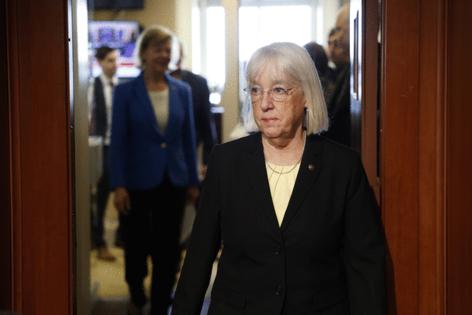Patty Murray, at UW Medicine, sounds alarm on RFK Jr. and vaccines
Published in Health & Fitness
SEATTLE — Putting the nation's leading anti-vaccine activist in charge of the massive federal department overseeing America's sprawling system of health care, disease control and medical research would "set our country back in a way that I cannot fathom," U.S. Sen. Patty Murray said Friday at a UW Medicine facility in Seattle.
Murray met with doctors and epidemiologists Friday, part of an attempt to raise alarm at the prospect of Robert F. Kennedy Jr. being confirmed as U.S. secretary of Health and Human Services.
President-elect Donald Trump has named Kennedy as his choice to lead the department that oversees Medicare, Medicaid, the Food and Drug Administration, the Centers for Disease Control and Prevention, and the National Institutes of Health.
Before his unsuccessful campaign for president, Kennedy was known for questioning the safety of vaccines and touting the debunked claim that childhood vaccinations cause autism. He has also pushed conspiracy theories including that AIDS is not caused by HIV and that COVID-19 "is targeted to attack Caucasians and Black people."
Murray said she was "stunned" to be having to defend vaccines in 2024.
"I wish everybody could go back in their memories to talk to their grandmothers about what it was like — the relief that I remember my mother having when I was really young, when, oh my gosh, we can send our kids to school, they'll get the polio vaccine, they will not have to live in an iron lung," Murray said. "The relief was overwhelming."
Murray said vaccinations and public health research have long had bipartisan public support. As recently as 2019, when the U.S. and Washington state were in the midst of the largest measles outbreak in decades, a U.S. Senate panel spoke nearly unanimously in support of the safety and importance of vaccines.
That began to change as COVID-19 vaccines were rolled out and everything related to the pandemic seemed to get politicized, said Dr. Helen Chu, a professor of medicine and epidemiology at the University of Washington.
Hesitancy with COVID-19 vaccines has now "bled over into childhood vaccinations," Chu said.
"The number of parents who are choosing to delay their childhood vaccines or are choosing to decline childhood vaccines has really gone higher and higher and higher," Chu said. "We're really at a turning point in how people are thinking about vaccine hesitancy."
Chu noted that Washington has seen 1,500 cases of whooping cough this year, the most in at least a decade.
That comes as childhood vaccination rates in Washington have waned since the pandemic.
In Washington, the rate of K-12 childhood immunizations has settled at around 90% the past few school years — lower than it was during the worst of the pandemic, though higher than before 2020. Public health officials have been particularly concerned about kindergartners, who have reported lower vaccination rates the past two years. During the 2023-24 school year, about 87% of them were up to date on immunizations, compared with about 91% during the 2020-21 year, state data show.
Those numbers are short of the threshold needed to guarantee herd immunity. For instance, the CDC says 95% vaccination is required to create herd immunity for measles and eliminate the disease.
As U.S. Health and Human Services secretary, Kennedy's ability to influence vaccination practices would be profound.
The FDA could delay approval of new vaccines or require additional studies for already approved vaccines. Health insurers and government programs look to the department to determine which vaccines should be paid for. Kennedy would oversee the program that both compensates people who have an adverse reaction to vaccines and also shields vaccine makers from liability. The department is responsible for billions of dollars in funding for medical research and disease prevention. Kennedy has said he would give infectious disease research "a break" to focus on chronic disease.
"To go to a place where we are not covering vaccines, where we're eliminating the research, where we're buying into this conspiracy theory, it's going to cost our country in lives, in health and in our economy," Murray said.
Republicans will control the Senate come January, with a 53-47 majority, meaning Kennedy (and other Trump appointees) won't need Democratic support to gain confirmation.
Kennedy's level of support among Republican senators is unclear.
Many have long been supportive of vaccines and public health programs. Republican Sen. Mitch McConnell, who will remain in the Senate but no longer as the party leader, had polio as a child and aired ads during the pandemic encouraging vaccination.
"Most of them have been fairly quiet," Murray said of her Republican colleagues' thoughts on Kennedy.
Kennedy has talked about making immediate cuts at the National Institutes of Health, the largest funder of medical research in the country.
Murray on Friday toured the lab of Marion Pepper, the chair of UW's department of immunology, where researchers were studying vaccines for COVID, flu and malaria. Her lab studies cells and tissue, looking to see if they're making "immune memory," and works to make better vaccines.
Researchers were using a flow cytometer, an $800,000 machine that can track individual cells and their immune response.
"NIH funding pays for everything in this building, everyone in my lab," Pepper said. "It is essential that we have the support of our government to fund basic research and to make sure that vaccines that are safe and effective are still produced."
(c)2024 The Seattle Times Distributed by Tribune Content Agency, LLC.










Comments